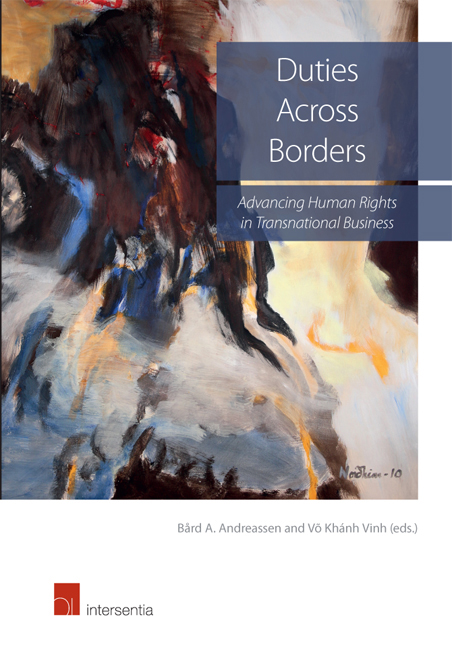Introduction. Business’ Duties Across Borders: The New Human Rights Frontier
Published online by Cambridge University Press: 21 September 2018
Summary
INTRODUCTION
Modern human rights are dynamic. Through their interpretation, and reinterpretation in new situations and contexts, human rights adapt to new challenges and societal risks to basic human interests. This volume addresses how this insight can be demonstrated through the expanding field of human rights studies in business entities. It presents and examines experiences of the new regulatory turns of commercial actors, and discusses recent developments in human rights standard-setting and advocacy.
Human rights have long been understood as being state-centric: The basic model of human right claims that the individual is the rights-holder and the state (i.e. by all state organs and actors) the duty-bearer. This remains the basic model of human rights, but it is increasingly being modified and developed in a world of rapid change in terms of a relative decline in state authority and the rise of a polycentric world with comparably more powerful non-state actors. Alluding to these changes, Alston argues that there is a need for a re-imagining of ‘the nature of the human rights regime in order to take adequate account of the fundamental changes’ that have occurred globally in recent decades. The present volume takes account of this insight, and situational human rights theory acknowledges that as part of contemporary globalisation, some types of non-state actors – notably business enterprises – are rapidly gaining influence and power that the human rights regime can no longer neglect.
Legal development – including human rights law – is generally reactive. It responds to new societal experiences that provoke a quest for regulation, restriction, and control. This is indeed what has happened in the field of human rights and business. Accidents and events that uproar ethical consciousness and public morals, outright violations of workers rights, and communities suffering from ruthless environmental exploitation are all types of experiences that have triggered demands for rights protection. Albeit slowly, attempts to define more precisely the human rights duties of commercial actors have been in process in response to experiences of economic globalisation. Accelerating rapidly with the neo-liberal economic policies introduced in the 1980s, globalisation has been structured by three interrelated processes: First, the growth of international economic, cultural, and normative interaction, ignited by the end of the Cold War, the economic reforms initiated in China under Deng Xiaoping, the invention of the World Wide Web, and a cascade of information technology innovations.
- Type
- Chapter
- Information
- Duties Across BordersAdvancing Human Rights in Transnational Business, pp. 1 - 20Publisher: IntersentiaPrint publication year: 2016

